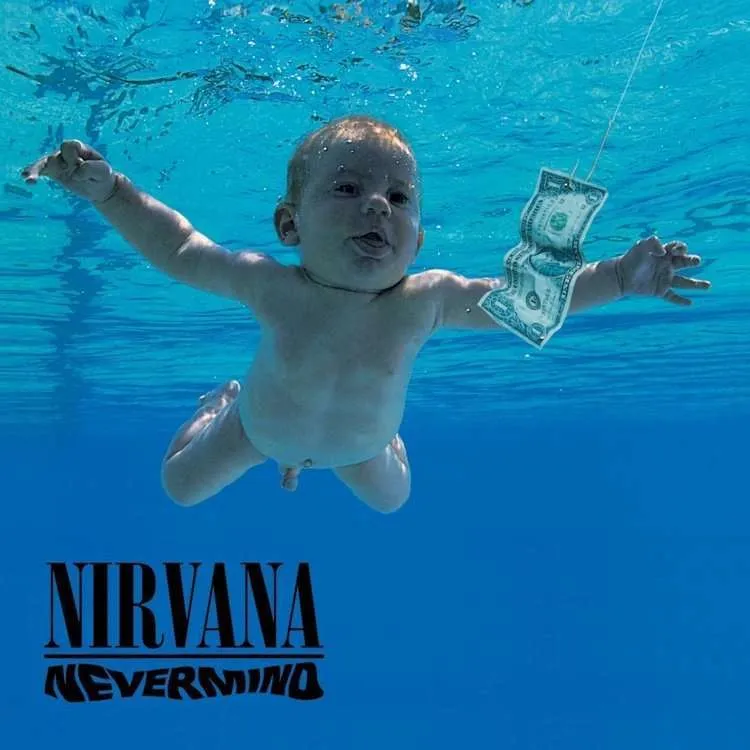
Cover artwork of the iconic album Nevermind, released by Nirvana on September 24th, 1991.
The estate of Nirvana is being sued over the artwork on the groundbreaking album, Nevermind. The litigant is the baby photographed on the cover.
Nirvana’s Nevermind is credited with changing the face of popular music forever. But nearly 30 years after its release, the album is now the subject of a sticky lawsuit.
According to a legal complaint obtained by Digital Music News, the person suing the Nirvana estate is the grown-up baby photographed on the cover. Spencer Elden, who is now 30, is also suing the photographer of the cover, Kirk Weddle, the album’s art director Robert Fisher, as well as Geffen Records, Nirvana LLC, the Estate of Kurt Cobain, the surviving members of Nirvana (including Dave Grohl), Warner Music Group, Universal Music Group, and several others.
The lawsuit claims that Nirvana, Weddle, the labels, and others engaged in “commercial child pornography” and a “sex trafficking venture” by featuring the four-month-old Elden on the cover. They are also accused of “violations of federal criminal child pornography statutes.”
“Defendants knowingly produced, possessed, and advertised commercial child pornography depicting Spencer, and they knowingly received value in exchange for doing so,” the suit states.
Elden is seeking damages of “all profits and unjust enrichment” from the album. Nevermind has sold more than 10 million albums in the United States alone.
Elden was actually the son of Weddle’s friend, Rick Elden.
Back in 1991, Rick agreed to feature his son on the cover for a modest $200 sum. He was later rewarded with a platinum version of the album by Geffen Records and a place in musical history. That sounded like a friendly deal, though the young Elden obviously didn’t consent to the photoshoot. Accordingly, the lawsuit alleges that Elden “was forced to engage in commercial sexual acts while under the age of 18 years old.”
“The permanent harm he has proximately suffered includes but is not limited to extreme and permanent emotional distress with physical manifestations, interference with his normal development and educational progress, lifelong loss of income earning capacity, loss of past and future wages, past and future expenses for medical and psychological treatment, loss of enjoyment of life, and other losses to be described and proven at trial of this matter,” the lawsuit claims.
The suit also recounts the history of how the album cover concept came together. Kurt Cobain played a critical role in conceptualizing the cover and demanded that Elden’s genitalia remain in the image. But Elden’s lawsuit depicts Cobain as a crude and exploitative sex trafficker, instead of a grunge rocker looking to shock an audience. “Cobain chose the image depicting Spencer — like a sex worker — grabbing for a dollar bill that is positioned dangling from a fishhook in front of his nude body with his penis explicitly displayed,” the lawsuit states.
[Robert] Fisher admired “[t]he positioning, the look on the baby’s face, the way that his arms were stretched out like he was reaching for something.”
Weddle was also described as a depraved participant in the cover-creation process. “In 1991, Weddle, a photographer, took explicit photos of Spencer, who was then a 4-month-old baby, in a pool at the Pasadena Aquatic Center in Pasadena, California,” the suit explains. “Weddle took a series of sexually graphic nude photographs of Spencer.”
“To ensure the album cover would trigger a visceral sexual response from the viewer, Weddle activated Spencer’s ‘gag reflex’ before throwing him underwater in poses highlighting and emphasizing Spencer’s exposed genitals.”
Interestingly, Elden has done numerous retakes of the album cover as an adult over the years.
He even tattooed ‘Nevermind’ on his chest. That suggested that Elden had embraced the cover and his role in rock history. But a GQ interview in 2016 revealed a change of heart: “It’s f—ked up,” Elden stated, referring to the cover. “I’m pissed off about it, to be honest.”
In the same interview, Elden revealed that surviving members of Nirvana seemed uninterested in participating in an art show he was hosting. He also noted that he doesn’t receive any royalties from the shoot.
Elden filed the suit with attorney Robert Y. Lewis of Marsh Law Firm PLLC.

